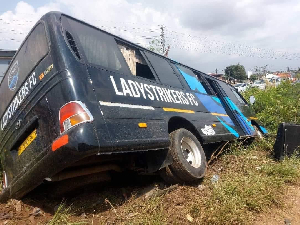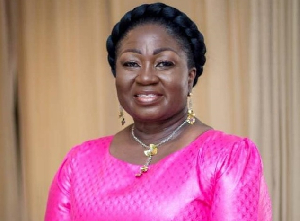The Ningo Prampram District Assembly (NiPDA) has undergone a social auditing exercise to assess the effectiveness of its activities in local communities.
The exercise, which is a community-led assessment, involves verifying projects the Assembly has done and checking on the ground to find out whether those projects are indeed executed.
Speaking to the Ghana News Agency (GNA) on Thursday after the presentation of the report of the audit committee, the Ningo Prampram District Chief Executive (DCE), Mr. Jonathan Teye Doku, hinted that the exercise was important and that the assembly would continue to give the committee all the support they needed to assess the work of the Assembly.
Mr. Doku said, “I think it is important, because we have been given resources to embark on projects in the District, so it’s important we allow others to assess the job you are doing. We are supposed to be accountable to the people we are serving. So getting feedback as to what we have done right or wrong helps in shaping policies and projects the Assembly embarks on.”
The DCE indicated that Assembly leadership could not be the repository of all wisdom and knowledge, so it was prudent to always engage the people to determine “what their interests were, what they needed, what we have implemented, what are the challenges, what we have done right, what we have done wrong, etc.”
Reacting to some observations with engineering faults on the facilities they visited, Mr. Doko observed that the Assembly would hold the contractors accountable for any defect.
He said, “There was always a defect liability period. If the contractor hands over the facility to the Assembly, it is within the six month period that we look out for some of these things. That is why we don’t pay the full amount; ten per cent for retention till we are satisfied that everything was complete.”
The DCE said the doors of the NiPDA were always opened for such exercises especially when the Assembly had nothing to hide, because it would only help to improve the quality of delivery.
The Focal Person for the Social Audit Committee, Madam Zubaida Damago, informed that previously, it was the Assembly which went to the community to inspect ongoing projects , “But this time they are empowering the citizens to ask questions and to check whether the Assembly had indeed done what it said it had done.”
Madam Damago, who is also the Development Planning Officer of the NiPDA, said the Assembly, which was the first to undergo the exercise, supported the audit committee in their work and ensured that the exercise was carried out smoothly.
She said, “We took the Assembly’s development plan and got the annual action plan, and out of the action plan, we got the activities, which had percentages of implementation.
But to know whether truly what they stated in the action plan was the reflection of what was on the ground, we took the progress report which told you what was happening on the actual ground.”
The Focal Person said the committee decided on health, education and agriculture, and out of these sectors they took a project each under the sectors, which were a teachers’ bungalow, a CHPS compound and an agriculture project.
According to the committee’s report, the Six Unit Teachers Bungalow was 96% completed but was not connected to electricity and water supplies, a situation which was beyond the Assembly because NiPDA had applied to the appropriate sectors for supply and were still waiting.
The CHPS Compound was also 96% completed and was actually in use even though it had not been formally handed over to health authorities.
On Agriculture, all the 40 participants who were selected attended the programme and the committee saw their yields.
“This has encouraged more women to go to the farm, especially because after the training a female won best farmer of the District. Others wanted to join the exercise and pleaded for more of such programmes to be organized,” Ms. Zubaida said.
The Audit Committee which undertook the exercise consisted of the Focal Person from the Assembly, two persons from community based organizations, and two queen-mothers from Ningo and Prampram Traditional Councils.
Regional News of Tuesday, 16 July 2019
Source: GNA

















